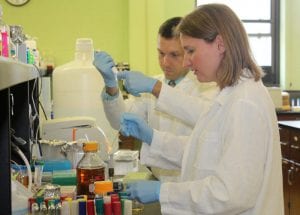WEST LIBERTY, W.Va., Aug. 2, 2017 — West Liberty University provided a biomedical internship opportunity for alumna Kathy Loughman this summer in the biology laboratory of Dr. Joseph Horzempa, located in the Arnett Hall of Natural Sciences.

Kathy Loughman and Dr. Joseph Horzempa are shown working in his biology lab.
The goal of her research was to identify extracts of natural products that inhibit the growth of the drug-resistant bacterium, Pseudomonas aeruginosa. This microorganism is a leading cause of hospital-acquired pneumonia and is often difficult to treat.
Loughman, who is a science teacher at John Marshall High School, took part in the 2017 Summer Research Internship program for high school science educators sponsored by the WV-INBRE (Idea Network of Biomedical Research Excellence, supported by a NIH grant).
“We are pleased to have this strong science partnership thanks to WV-INBRE and our science faculty. It is another example of the robust academic opportunities that exist here on the Hilltop,” said Dr. Stephen Greiner, WLU president.
Science teachers who qualified for the paid summer research received up to nine weeks of biomedical internship work from May 23 through July 31.
“Kathy was investigating natural products from plants, algae, marine life and fungi and she discovered several species that exhibit antibiotic properties toward drug-resistant bacteria,” said Horzempa, who is an associate professor of biology and director for WLU’s new master’s in biology program.
“These are natural occurring substances that were provided through a partnership with the National Center for Natural Products Research, located in Mississippi. This institution provided us with more than 3,000 extracts. Kathy screened all 3,000 samples over the summer. The beauty of this is that these extracts may contain substances that might be useful as a new antibiotic,” he said.
“Kathy worked in my lab at least five days a week, while performing this work. We would discuss her efforts and results and do a little tweaking and troubleshooting together, but Kathy did all the benchwork,” he added.
“I was thrilled to receive this opportunity and perform the research that could ultimately lead to improved health care options. I also look forward to sharing my work with my students. It is important to show students that teachers who teach can do,” said Loughman, who has been a teacher at John Marshall for 10 years.
Natural substances from sumac seemed to be the most promising, she concluded. The next step is to isolate and identify the active compounds from each of the extracts, according to Horzempa, who hopes to attract more funding to continue the work.
“Several federal agencies have expressed an interest in this research and how it will improve wound care,” he said.
This wasn’t the first time that Loughman worked with Horzempa. In 2016 she was the lead author in an important research paper. But her WLU connections don’t stop there, since she also is married to WLU associate professor of biology and alumnus Dr. Zachary Loughman.
The couple actually met in a botany lab, taught by Dr. Roger Seeber, another WLU biology professor.
The summer research opportunity that Loughman enjoyed was offered to HSTA (Health, Sciences & Technology Academy) teachers and those teachers who work in HSTA-affiliated schools, according to WV-INBRE. (HSTA teachers assist first generation college students in achieving degrees.)
Research opportunities this summer also existed in biomedical labs at West Virginia University, Marshall University and other WV-INBRE-funded laboratories at partner institutions.
Besides the researcher’s salary, WV-INBRE provided additional funds to the mentor’s laboratory for supplies.
Horzempa’s research laboratory is a busy place with about 30 students working under his direction during the school year. He also employs paid research assistant James Healy, who also is enrolled in the MA/MS in biology program.
For more information, please visit westliberty.edu or you may reach Horzempa at 304.336.8284 or joseph.horzempa@westliberty.edu.
The post Science Partnership May Lead to New Antibiotic appeared first on News & Media Relations.